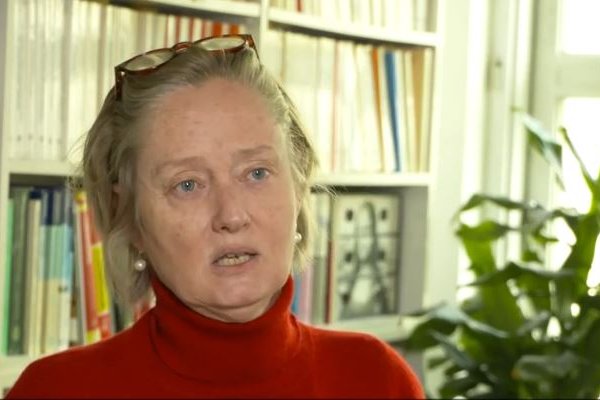Ao.Univ.-Prof.in Dr.in Bettina Grasl-Kraupp
EUROPEAN Registered ToxicologistGruppenleiterin
T: +43 (0)1 40160-57564
F: +43 (0)1 40160-957616
bettina.grasl-kraupp@meduniwien.ac.at
ORCID: 0000-0003-4889-6531
Forschungsschwerpunkt
Das hepatozelluläre Karzinom ist weltweit eine der häufigsten Krebstodesursachen. Die Inzidenz dieser Erkrankung ist in Österreich und anderen europäischen Ländern steigend. Die Prognose für Betroffene ist in der Regel sehr schlecht. Wissensbasierte Fortschritte bei der Prävention und Therapie dieser Krebserkrankung sind daher sehr wichtig.
Einwirkung von Fremdstoffen, einschließlich der Aufnahme von Nahrungsbestandteilen oder Kontaminanten in der Nahrungskette, ist eine der wichtigsten Krebsursachen beim Menschen. Unser Forschungsschwerpunkt dient daher einer besseren Kenntnis der chemischen Hepatokarzinogenese und der einzelnen Schritte in diesem komplexen Prozess.
Ausgewählte Publikationen
Systemic PFOS and PFOA exposure and disturbed lipid homeostasis in humans: what do we know and what not?
Fragki S, Dirven H, Fletcher T, Grasl-Kraupp B, Bjerve Gützkow K, Hoogenboom R, Kersten S, Lindeman B, Louisse J, Peijnenburg A, Piersma AH, Princen HMG, Uhl M, Westerhout J, Zeilmaker MJ, Luijten M.
Crit Rev Toxicol. 2021 Feb;51(2):141-164. doi: 10.1080/10408444.2021.1888073
Interaction of FGF9 with FGFR3-IIIb/IIIc, a putative driver of growth and aggressive behaviour of hepatocellular carcinoma
Paur J, Valler M, Sienel R, Taxauer K, Holzmann K, Marian B, Unterberger A, Mohr T, Berger W, Gvozdenovich A, Schimming J, Grusch M, Grasl-Kraupp B.
Liver Int. 2020 Sep;40(9):2279-2290. doi: 10.1111/liv.14505
Risk assessment of aflatoxins in food
EFSA Panel on Contaminants in the Food Chain (CONTAM)
Schrenk D, Bignami M, Bodin L, Chipman JK, Del Mazo J, Grasl-Kraupp B, Hogstrand C, Hoogenboom LR, Leblanc JC, Nebbia CS, Nielsen E, Ntzani E, Petersen A, Sand S, Schwerdtle T, Vleminckx C, Marko D, Oswald IP, Piersma A, Routledge M, Schlatter J, Baert K, Gergelova P, Wallace H.
EFSA J. 2020 Mar 9;18(3):e06040. doi: 10.2903/j.efsa.2020.6040
Analysis of Liver Cancer Cell Lines Identifies Agents With Likely Efficacy Against Hepatocellular Carcinoma and Markers of Response
Caruso S, Calatayud AL, Pilet J, La Bella T, Rekik S, Imbeaud S, Letouzé E, Meunier L, Bayard Q, Rohr-Udilova N, Péneau C, Grasl-Kraupp B, de Koning L, Ouine B, Bioulac-Sage P, Couchy G, Calderaro J, Nault JC, Zucman-Rossi J, Rebouissou S.
Gastroenterology. 2019 Sep;157(3):760-776. doi: 10.1053/j.gastro.2019.05.001
Risk assessment of nitrate and nitrite in feed
EFSA Panel on Contaminants in the Food Chain (CONTAM)
Schrenk D, Bignami M, Bodin L, Chipman JK, Del Mazo J, Grasl-Kraupp B, Hoogenboom LR, Leblanc JC, Nebbia CS, Nielsen E, Ntzani E, Petersen A, Sand S, Schwerdtle T, Vleminckx C, Wallace H, Bampidis V, Cottrill B, Frutos MJ, Furst P, Parker A, Binaglia M, Christodoulidou A, Gergelova P, Guajardo IM, Wenger C, Hogstrand C.
EFSA J. 2020 Nov 4;18(11):e06290. doi: 10.2903/j.efsa.2020.6290
Mesenchyme-derived growth factors enhance preneoplastic growth by non-genotoxic carcinogens in rat liver
Nejabat M, Riegler T, Reitinger T, Subosits S, Römer M, Eichner J, Bilban M, Zell A, Huber WW, Schulte-Hermann R, Grasl-Kraupp B.
Arch Toxicol. 2018 Feb;92(2):953-966. doi: 10.1007/s00204-017-2080-0
Risk to human health related to the presence of perfluorooctane sulfonic acid and perfluorooctanoic acid in food
EFSA Panel on Contaminants in the Food Chain (CONTAM)
Knutsen HK, Alexander J, Barregård L, Bignami M, Brüschweiler B, Ceccatelli S, Cottrill B, Dinovi M, Edler L, Grasl-Kraupp B, Hogstrand C, Hoogenboom LR, Nebbia CS, Oswald IP, Petersen A, Rose M, Roudot AC, Vleminckx C, Vollmer G, Wallace H, Bodin L, Cravedi JP, Halldorsson TI, Haug LS, Johansson N, van Loveren H, Gergelova P, Mackay K, Levorato S, van Manen M, Schwerdtle T.
EFSA J. 2018 Dec 13;16(12):e05194. doi: 10.2903/j.efsa.2018.5194. eCollection 2018 Dec.
Proliferation markers are associated with MET expression in hepatocellular carcinoma and predict tivantinib sensitivity in vitro
Rebouissou S, La Bella T, Rekik S, Imbeaud S, Calatayud AL, Rohr-Udilova N, Martin Y, Couchy G, Bioulac-Sage P, Grasl-Kraupp B, de Koning L, Ganne-Carrie N, Nault JC, Ziol M, Zucman-Rossi J.
Clin Cancer Res. 2017 Aug 1;23(15):4364-4375. doi: 10.1158/1078-0432.CCR-16-3118. .
Fibroblast growth factor receptor 3 isoforms: Novel therapeutic targets for hepatocellular carcinoma?
Paur J, Nika L, Maier C, Moscu-Gregor A, Kostka J, Huber D, Mohr T, Heffeter P, Schrottmaier WC, Kappel S, Kandioler D, Holzmann K, Marian B, Berger W, Grusch M, Grasl-Kraupp B.
Hepatology. 2015 Dec;62(6):1767-78. doi: 10.1002/hep.28023.
Proinflammatory mesenchymal effects of the non-genotoxic hepatocarcinogen phenobarbital: a novel mechanism of antiapoptosis and tumor promotion
Riegler T, Nejabat M, Eichner J, Stiebellehner M, Subosits S, Bilban M, Zell A, Huber WW, Schulte-Hermann R, Grasl-Kraupp B.
Carcinogenesis. 2015 Dec;36(12):1521-30. doi: 10.1093/carcin/bgv135.
Alle Publikationen
Vorstellung Bettina Grasl-Kraupp, Siegfried Knasmüller

Nach der Aktivierung werden Daten an YouTube übermittelt. Weitere Infos hier: Datenschutzerklärung
